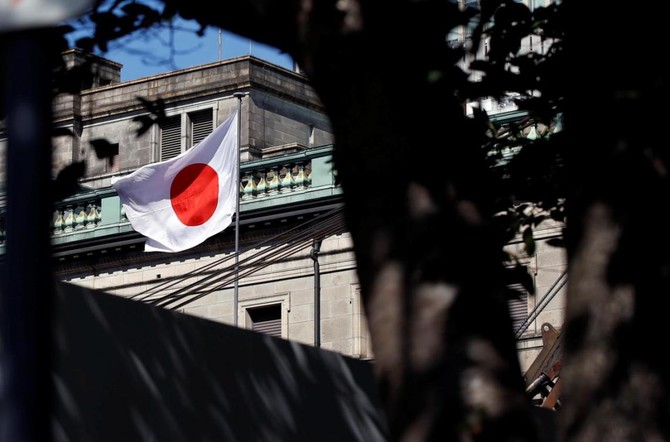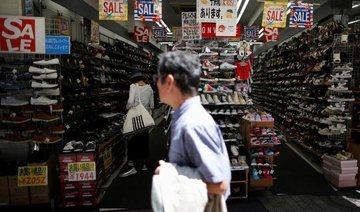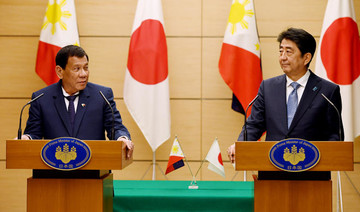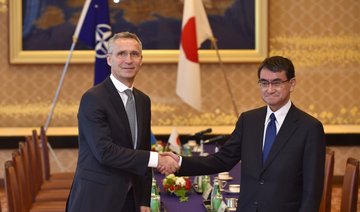TOKYO: Japan will curb asylum seekers’ rights to work and detain any not deemed refugees or who have made multiple applications, the Yomiuri daily reported on Tuesday, in a move to further tighten one of the developed world’s toughest refugee systems.
From as early as mid-November, Japan will only allow those it regards as bona fide refugees the right to work. The Justice Ministry estimates that the new rule will effectively deny the right to work for more than 10,000 asylum seekers a year who don’t qualify for refugee status, the Yomiuri said, without citing sources.
Others, including those who fail to qualify as refugees in initial checks and multiple asylum applicants, will be held in detention centers after their permission to stay in Japan expires, the report said.
At present, asylum seekers with valid visas receive renewable permits allowing them to work in Japan while their refugee applications are reviewed — a system the government says encourages people to seek asylum in order to work.
“We are looking at policies, including that in the (Yomiuri) article. We haven’t decided whether to put it into action,” said Yasuhiro Hishida, a Justice Ministry official overseeing refugee recognition.
Japan accepted just three refugees in the first half of 2017 despite a record 8,561 fresh asylum applications, and only 28 in 2016. Human Rights Watch in January described the country’s record on asylum seekers as “abysmal.”
The prospect of the crackdown drew criticism from Japan’s most prominent refugee organization, which said that asylum seekers would struggle to make ends meet without work permits.
“It’s essential that minimum living conditions are ensured while people apply for asylum,” said Eri Ishikawa of the Japan Association for Refugees.
The world’s third biggest economy has remained unwelcoming to immigration despite a shrinking, aging population that has exacerbated the worst labor shortages in four decades and drags on an already slow economic growth.
Japan’s reluctance to accept foreign workers and refugees is in contrast to the policies of other industrialized countries, and has forced labor-hungry industries including construction and manufacturing to rely on asylum seekers with work permits.
Immigration remains a controversial subject in Japan, where many pride themselves on cultural and ethnic homogeneity.
Almost six in 10 Japanese think diversity of ethnic groups, religions and races makes their country a worse place, a poll this month by the Pew Research Center showed.
Japan to reportedly launch crackdown on asylum seekers
Japan to reportedly launch crackdown on asylum seekers

Over 100 former senior officials warn against planned staff cuts at US State Department

- State Secretary Rubio faulted for recklessness in amid "unprecedented challenges from strategic competitors, ongoing conflicts, and emerging security threats"
WASHINGTON: More than 130 retired diplomats and other former senior US officials issued an open letter on Thursday criticizing a planned overhaul of the State Department that could see thousands of employees laid off.
“We strongly condemn Secretary of State Marco Rubio’s announced decision to implement sweeping staff reductions and reorganization at the US Department of State,” the officials said in the letter.
The signatories included dozens of former ambassadors and senior officials, including Susan Rice, who served as national security adviser under President Barack Obama, a Democrat.
The timing of the cuts remains unclear, with the US Supreme Court expected to weigh in at any moment on a bid by US President Donald Trump’s administration to halt a judicial order blocking the firings.
The administration in late May notified Congress of a plan to overhaul its diplomatic corps that could cut thousands of jobs, including hundreds of members of its elite Foreign Service who advocate for US interests in the face of growing assertiveness from adversaries such as China and Russia.
Initial plans to send the notices last month were halted after a federal judge on June 13 temporarily blocked the State Department from implementing the reorganization plan.
The shake-up forms part of a push by Trump to shrink the federal bureaucracy, cut what he says is wasteful spending and align what remains with his “America First” priorities.
“At a time when the United States faces unprecedented challenges from strategic competitors, ongoing conflicts, and emerging security threats, Secretary Rubio’s decision to gut the State Department’s institutional knowledge and operational capacity is reckless,” the former officials wrote.
US Supreme Court sides with Trump in South Sudan deportation fight

- Trump administration has sought to deport 8 migrants to unstable South Sudan
- District judge had said the deportation attempt violated his injunction
WASHINGTON: The US Supreme Court again sided with President Donald Trump’s administration in a legal fight over deporting migrants to countries other than their own, lifting on Thursday limits a judge had imposed to protect eight men who the government sought to send to politically unstable South Sudan.
The court on June 23 put on hold Boston-based US District Judge Brian Murphy’s April 18 injunction requiring migrants set for removal to so-called “third countries” where they have no ties to get a chance to tell officials they are at risk of torture there, while a legal challenge plays out.
The court on Thursday granted a Justice Department request to clarify that its June 23 decision also extended to Murphy’s separate May 21 ruling that the administration had violated his injunction in attempting to send a group of migrants to South Sudan. The US State Department has urged Americans to avoid the African nation “due to crime, kidnapping and armed conflict.”
Two liberal justices, Sonia Sotomayor and Ketanji Brown Jackson, dissented from the decision.
The court said that Murphy should now “cease enforcing the April 18 injunction through the May 21 remedial order.”
Murphy’s May 21 order mandating further procedures for the South Sudan-destined migrants prompted the US government to keep the migrants at a military base in Djibouti. Murphy also clarified at the time that non-US citizens must be given at least 10 days to raise a claim that they fear for their safety.
After the Supreme Court lifted Murphy’s April injunction on June 23, the judge promptly ruled that his May 21 order “remains in full force and effect.” Calling that ruling by the judge a “lawless act of defiance,” the Justice Department the next day urged the Supreme Court to clarify that its action applied to Murphy’s May 21 decision as well.
Murphy’s ruling, the Justice Department said in court filings, has stalled its “lawful attempts to finalize the long-delayed removal of those aliens to South Sudan,” and disrupted diplomatic relations. Its agents are being “forced to house dangerous criminal aliens at a military base in the Horn of Africa that now lies on the borders of a regional conflict,” it added.
Even as it accused the judge of defying the Supreme Court, the administration itself has been accused of violating judicial orders including in the third-country deportation litigation.
The administration has said its third-country policy is critical for removing migrants who commit crimes because their countries of origin are often unwilling to take them back. The Supreme Court has a 6-3 conservative majority. Its three liberal members dissented from the June 23 decision pausing Murphy’s injunction, with Justice Sonia Sotomayor calling it a “gross abuse” of the court’s power that now exposes “thousands to the risk of torture or death.”
After the Department of Homeland Security moved in February to step up rapid deportations to third countries, immigrant rights groups filed a class action lawsuit on behalf of a group of migrants seeking to prevent their removal to such places without notice and a chance to assert the harms they could face.
In March, the administration issued guidance providing that if a third country has given credible diplomatic assurance that it will not persecute or torture migrants, individuals may be deported there “without the need for further procedures.”
Murphy found that the administration’s policy of “executing third-country removals without providing notice and a meaningful opportunity to present fear-based claims” likely violates due process requirements under the US Constitution. Due process generally requires the government to provide notice and an opportunity for a hearing before taking certain adverse actions.
The Justice Department on Tuesday noted in a filing that the administration has received credible diplomatic assurances from South Sudan that the aliens at issue will not be subject to torture.”
The Supreme Court has let Trump implement some contentious immigration policies while the fight over their legality continues to play out. In two decisions in May, it let Trump end humanitarian programs for hundreds of thousands of migrants to live and work in the United States temporarily. The justices, however, faulted the administration’s treatment of some migrants as inadequate under constitutional due process protections.
Explosive drone intercepted near Irbil airport in northern Iraq, security statement says

- The “Flight operations at the airport continued normally,” the Irbil airport authority said
IRBIL, Iraq: An explosive drone was shot down near Irbil airport in northern Iraq on Thursday, the Iraqi Kurdistan’s counter-terrorism service said in a statement.
There were no casualties reported, according to two security sources.
The “Flight operations at the airport continued normally and the airport was not affected by any damage,” the Irbil airport authority said in a statement.
The incident only caused a temporary delay in the landing of one aircraft, the statement added.
Saudi authorities close 996 establishments over health violations

RIYADH: A total of 5,912 inspections covering 4,307 establishments were carried out across the Kingdom by the Saudi Food and Drug Authority in April and May.
A total of 996 were shut down due to various violations, while 136 were closed for operating without required licenses and for product safety breaches.
Additionally, production lines at 127 establishments were halted and 1,750 types of products were seized.
The initiative is part of the SFDA’s efforts to ensure compliance with approved regulations and to uphold high quality standards.
At one food establishment, inspectors found raw materials of an unknown origin, employees without health certificates, the absence of a tracking system and inadequate measures being taken to prevent cross-contamination. These led to the closure of the business and the implementation of necessary legal measures.
Need for global collaboration to fight drought stressed

- Saudi Arabia, along with partners, launched the Riyadh Global Drought Resilience Partnership on the first day of the 4th International Conference on Financing for Development
RIYADH: As part of the Kingdom’s efforts to mitigate the impacts of desertification, improve air quality and achieve its sustainable development goals, Saudi Arabia, along with partners, launched the Riyadh Global Drought Resilience Partnership on the first day of the 4th International Conference on Financing for Development.
Held in Seville, Spain, from June 30 to July 3, the four-day event saw the participation of 70 countries, including attendance by local and international ministers, environmental organizations and financial development entities.
Among the participants was Saudi Deputy Minister for Environment, Water and Agriculture Osama Faqeeha.
Faqeeha, who is also the adviser to the 16th session of the Conference of the Parties Presidency, emphasized the significance of collaborative efforts and innovation to address the escalating threat of climate change that resulted in complicated and devastating environmental issues such as drought.
Faqeeha said: “The Riyadh Drought Resilience Partnership will serve as a global facilitator, a ‘one-stop shop’ for drought resilience, promoting the shift from reactive relief response after drought hits to proactive preparedness.
“We also seek to amplify global resources to save lives and livelihoods around the world.”
The deputy minister said that solutions should be applied through strategies and mechanisms to ensure enhanced resilience in the areas that were mostly affected by drought and climate change globally.
He praised the partnership with the International Drought Resilience Alliance, a global coalition that aims to build resilience against droughts and climate change.
He said it was fundamental to bridging the gap between the political and financial aspects to ensure the achievement of long-term sustainable development objectives.
The discussion highlighted some of the national efforts and strategies for environmental sustainability, including efforts by the OPEC Fund for International Development, the Islamic Development Bank and the CAF Development Bank of Latin America.






















